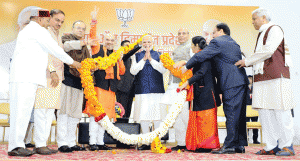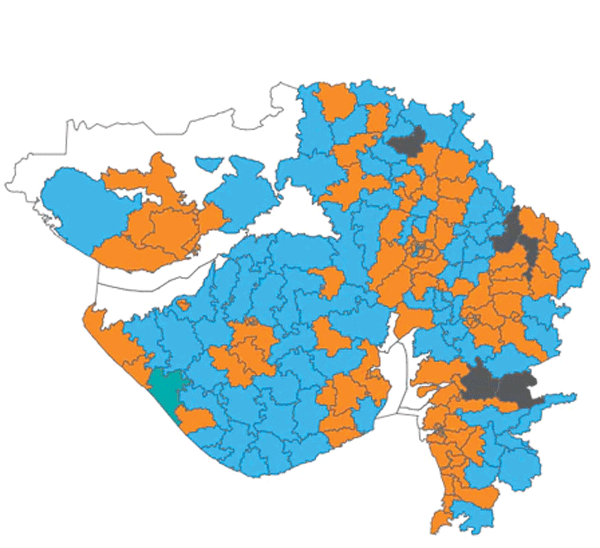Bhupender Yadav
The results of the 2017 Gujarat and Himachal Pradesh assembly elections reaffirm the prime minister’s resolve to make a “New India” and indicate that this vision is moving forward. These results are a sign of a big shift in Indian politics. Traditionally, the Congress has tried to keep elections centred on caste, dynasty and social considerations. However, the BJP under the leadership of Narendra Modi, chose to defy the medieval politics of the Congress and fought the election on the planks of development and good governance. Under the stewardship of national president Amit Shah, the BJP has gained ground ideologically and organisationally.

The Gujarat elections were held at a time when the Congress not only opposed the BJP’s development agenda but also indulged in a confusing perception-based politics. It even tried to ridicule the concept of “vikas”. The BJP continuously moved ahead in its electoral campaign on the issue of development. Multiple agencies have found the annual growth rate of Gujarat to be above 10 per cent. In the past 22 years, BJP rule has seen all-round development, including in agriculture, health and education. In consonance with the policies of the government, adequate new opportunities for employment were also created.
During its term, the Modi-led government has taken two tough decisions — GST and demonetisation. When such epoch-making decisions are taken, some discomfort takes place temporarily. The Congress thought that it could win the Gujarat elections on these issues. However, the people of Gujarat defied the claims of the Congress. This also makes clear the fact that the development model that evolved in Gujarat is an inclusive one. Even according to the Ranganath Mishra Commission, during the tenure of the Congress government, the development of minorities in Gujarat was more balanced than in most Congress-run states.
Development is not just about economic factors or economic policies. It consists of multiple dimensions like law and order, security of women, transparent implementation of welfare schemes, removal of corruption, decisive leadership, etc. In all of these, the BJP-ruled Gujarat fared exceedingly well during the last 22 years.
The success of the BJP since winning the Lok Sabha election in 2014 has continued. The BJP won Maharashtra, Jharkhand, Jammu and Kashmir, Arunachal Pradesh, Assam, Uttarakhand, Uttar Pradesh, Manipur and Goa. Gujarat and Himachal are just further additions. This is proof of the leadership of Modi and the organisational skills of Shah.
During the erstwhile rule of the Congress, the politics of “KHAM” gained prominence, which meant that particular sections of society were grouped together to form a vote bank. The Congress also tried to manufacture petty differences within communities. However, if one analyses this election as a whole, it becomes clear that Rahul Gandhi and the Congress outsourced the campaign to forces that tried to divide Gujarat into different castes, communities and sections. The underlying objective being that the social fabric of Gujarat is torn to pieces for political gains. However, the people of Gujarat chose the politics of good governance.
This election was also a direct contest between “democracy” and “dynasty”. Continuing the tradition and culture of “dynasty”, Rahul Gandhi chose himself as Congress president. On the other hand, a democratic BJP has been successful in expanding its base in areas and sections of society where it was weak. The BJP and its leaders conducted several programmes and undertook long yatras to interior parts of the state. The BJP held more rallies in tribal and other areas. This year marks the birth centenary of Deendayal Upadhyaya. The BJP started a “vistarak” campaign that is reaching every corner of the society. Organisationally, they have reached every booth and “shakti kendra” — the literal power centre of the BJP’s democratic organisation. The BJP could reach out to the people and communicate the past 22 years of good governance through this democratic set up.
When the Congress was talking about bullock carts, the BJP brought a seaplane as a model of development.
This election was a choice between “New India” and “medieval politics”. New India is where we can take all those decisions which are in the national interest and for the welfare of the people. The party and the person taking those decisions might have had to bear the brunt of taking the decisions but that did not deter them. On the other hand, the “medieval politics” is one of lies and slander. The Congress lied and engaged in slander campaigns against the PM, the BJP and the tough decisions and policies we followed. Thankfully, it did not work. Amit Shah conducted “youth town hall” programmes to interact directly with the youth of Gujarat, which were attended by about 2 lakh young men and women. PM Modi directly communicated with party cadre and different sections of society during his visits to the state and through several rallies.
Another significant message of this election is that the people clearly understand the “use and throw” politics that the Congress habitually practises. From Dalits and OBCs to minorities, all sections of society have understood that the politics of the Congress is only to divide them for their votes.
It is for these reasons that the BJP won Gujarat despite a high-decibel campaign of lies and slander. This result is a landmark in the democratic journey of the country.
The principles through which the country moves forward include family values, culture, fraternity, development and a resolve to make a developed India using technology. The BJP has got the mandate to realise its vision of “New India”.
(The writer is MP Rajya Sabha, BJP National General Secretary and In-charge of Gujarat.)


